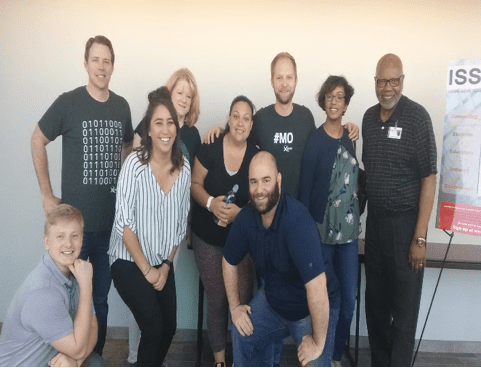CCN FOCUS: Garfield Anderson of Gwinnett Technical College (GTC)
For the past two years, the National Convergence Technology Center (CTC) has featured blogs that introduced some of our professors and instructors in the Convergence College Network (CCN) community. The CCN is a select cohort of community colleges and universities from across the country that connects IT educators with a wealth of resources to enhance their programs. In this week’s Q&A blog, we’re featuring Garfield Anderson, Dean of Computer Science at Gwinnett Technical College (GTC) in Lawrenceville, GA. 
What do you teach? Prior to becoming Dean of Computer Science, I taught A+, Networking Fundamentals and Microsoft Server courses both online and face-to-face.
How long have you been a teacher? I was a Skills Facilitator, and a Leadership and Management Instructor in the United States Navy. I earned the designation “Master Training Specialist” and started teaching in 1984. I retired from the Navy in 1995. I was an Instructor at Georgia Technical College until 2005, and Assistant Professor of Computer Information Systems at University of North Georgia until 2014. I started teaching full time at Gwinnett Technical College in 2014. I have been teaching for over 37 years.
Did you have a job in industry before you became a teacher? I have never worked in the computer industry. I was a Restaurant Manager from 1995-2004, serving as Food Service Director at Greenville County Detention Center in Greenville, South Carolina and Manager of several Golden Corral Restaurants in the Atlanta, Georgia metro area. After graduating with a Master’s in Information Systems, I read computer books and the entire help section of the Windows operating system. I am a self-taught IT operator having performed any lab that I can get my hands on. I built my home network to include routers, servers and virtual machines. I love to tinker with technology.
What sparked your interest in teaching? Teaching became a passion of mine while in the military. I enjoyed engaging others to make and understand a point. After military retirement, I wanted to teach something that I really enjoyed talking about and that was computer technology. So, sharing my knowledge with students is not work but a hobby to me.
What is the secret to successfully teaching IT to students? Enter the classroom with a strategy to engage students. Students must be allowed to participate in the learning process. They must be allowed to debate and share their understanding of a concept. They must be allowed to publicly apply their understanding of a concept to a real life-like situation. This public application makes for deep learning that will stay with the student for a long time.
What’s the biggest challenge teaching IT? Most students come to an IT class with some knowledge of computer technology. The biggest challenge in teaching IT is to take students from their individual knowledge level on a subject and move them to a higher level all at the same time. This takes getting to know the students and having a flexible teaching style. Capturing and maintaining student interest is the biggest challenge. How do you capture and maintain students’ interest? I ask direct questions and seek examples from student experience on the subject. What is your teaching style? My style is that of a facilitator. Through questions, I guide students to specific conclusions.
Do you have a favorite class to teach? If so, why? I love teaching A+ Certification classes. This class touches on almost all computer technology topics. It also allows for hands-on application. Since I have a computer repair business, the class also allows me to discuss business related issues such as customer service.
What is the best thing about being a teacher? Knowledge shared between teacher, student and peers. The learning environment is so positive, stress free (for the most part) and relaxing. People like sharing what they know and listening to interesting things that they don’t know.
What advice would you give an IT student about to graduate and enter the workforce? Never stop learning! Realize that they can learn something from every occurrence. Don’t be afraid to fail. There are learning opportunities in every fail situation.
IT is always changing – how do you keep up with the ongoing evolution of IT? Reading and investigating new concepts. How do you investigate new concepts? I keep a log of items that are unfamiliar to me so that I can look them up during my research time. I love attending conferences and meeting new people that are just as passionate about computer technology as I am.
How do you see the IT landscape changing in the next 5 years? I don’t see IT changing that much in the next 5 years. Yes, existing technology will be more fine-tuned, but I think that visible change will be significant in the next 10 years. Today’s emerging technology should be mainstream in the next ten years.
